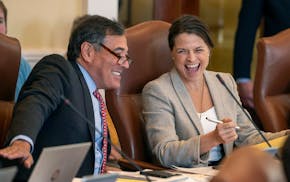One of 21 states whose elections systems Russian hackers targeted in 2016, Minnesota is still the only one unable to use federal money awarded to improve election security across the country.
But an early victory this week in the House has Secretary of State Steve Simon optimistic that he will soon be able to access that money to update the state's voter registration system, among other upgrades, in what could be one of the first pieces of legislation to reach Gov. Tim Walz's desk.
Two House measures seeking to utilize $6.6 million in federal Help America Vote Act (HAVA) funds made available to the state last year won quick passage in House committee this week. The proposals died last year after being tied up in a broad spending package Gov. Mark Dayton vetoed as part of a feud with legislators.
The bills, whose authors include both Republican and Democratic lawmakers who have previously worked together on election security, must still clear another House committee before a floor vote and subsequent Senate consideration. But both House Speaker Melissa Hortman, DFL-Brooklyn Park, and Senate Majority Leader Paul Gazelka, R-Nisswa, have respectively described the legislation as one of the less controversial items that could quickly be taken up this session.
"Election security is national security," Walz said in a statement Thursday. "We know outside forces are attempting to attack our election system, including here in Minnesota. I support efforts to enhance and harden our election cybersecurity, and would welcome legislation to my desk that tackles this critical issue head on."
In a letter this week to the federal Election Assistance Commission, which oversees how the HAVA funds are spent, Simon outlined using more than a third of the funds to hire personnel to work in cybersecurity and to upgrade the state's 14-year-old Statewide Voter Registration System (SVRS).
Though Minnesota's election system was not breached in 2016, Simon has pointed out that the two states whose systems were penetrated were compromised via systems similar to Minnesota's SVRS. Simon said it would take about four years to recode Minnesota's system. "We've lost at this point nearly a year in a process that's critically important," Simon said in an interview Thursday.
Both Simon and elected officials working on getting the money appropriated are less concerned about operations that could hit the state at the ballot box, where Minnesota still relies on a paper ballot system.
Rep. Tim O'Driscoll, R-Sartell, one of the two House bills' authors, is among those sounding the alarm over concerns that hackers could delete or otherwise compromise voters' information kept in the electronic SVRS. "It doesn't matter if you're a Democrat, Republican or Independent: Everybody wants to have our voter registration system secure and have confidence in the voting procedures in the state of Minnesota," O'Driscoll said Thursday. "And that includes the data used for elections and the data that we also maintain on voters."
Minnesota's election system did not encounter foreign interference during the 2018 election, according to Simon, who will travel to Washington next month for another classified briefing from Homeland Security Secretary Kirstjen Nielsen. In testimony this week before a pair of House committees, Simon relayed Nielsen's message that 2016 "was an attack."
"What they've told us over and over again in the intelligence community is expect more of this and expect it from more sources," Simon said.
Simon's proposal for the election security grant also included $1.2 million in cybersecurity technology and $700,000 in voting equipment, plus $1 million as grants for local voting jurisdictions. It proposes an additional $400,000 to help train elections workers around the state, as Simon has underlined that just nine counties have full-time workers dedicated to elections administration.
Rep. Jim Nash, R-Waconia, who is on the House subcommittee on elections and who works in the cybersecurity industry, said this week that the measures would keep up with the increased online exposure of voters and voting systems.
"This is not meant to look for a Russian under every rock but this is meant to say that this is critical infrastructure and this is something that we need to take seriously," Nash said. "To put it in perspective: In the private sector and in other government sectors, this is a billion-dollar-a-year activity that people spend to shore up their companies' defenses and their governments' defenses."
Stephen Montemayor • 612-673-1755 Twitter: @smontemayor
The Latest | A second seated juror dismissed by judge from Trump's hush money trial

Biden scores endorsements from Kennedy family, looking to shore up support against Trump and RFK Jr.

